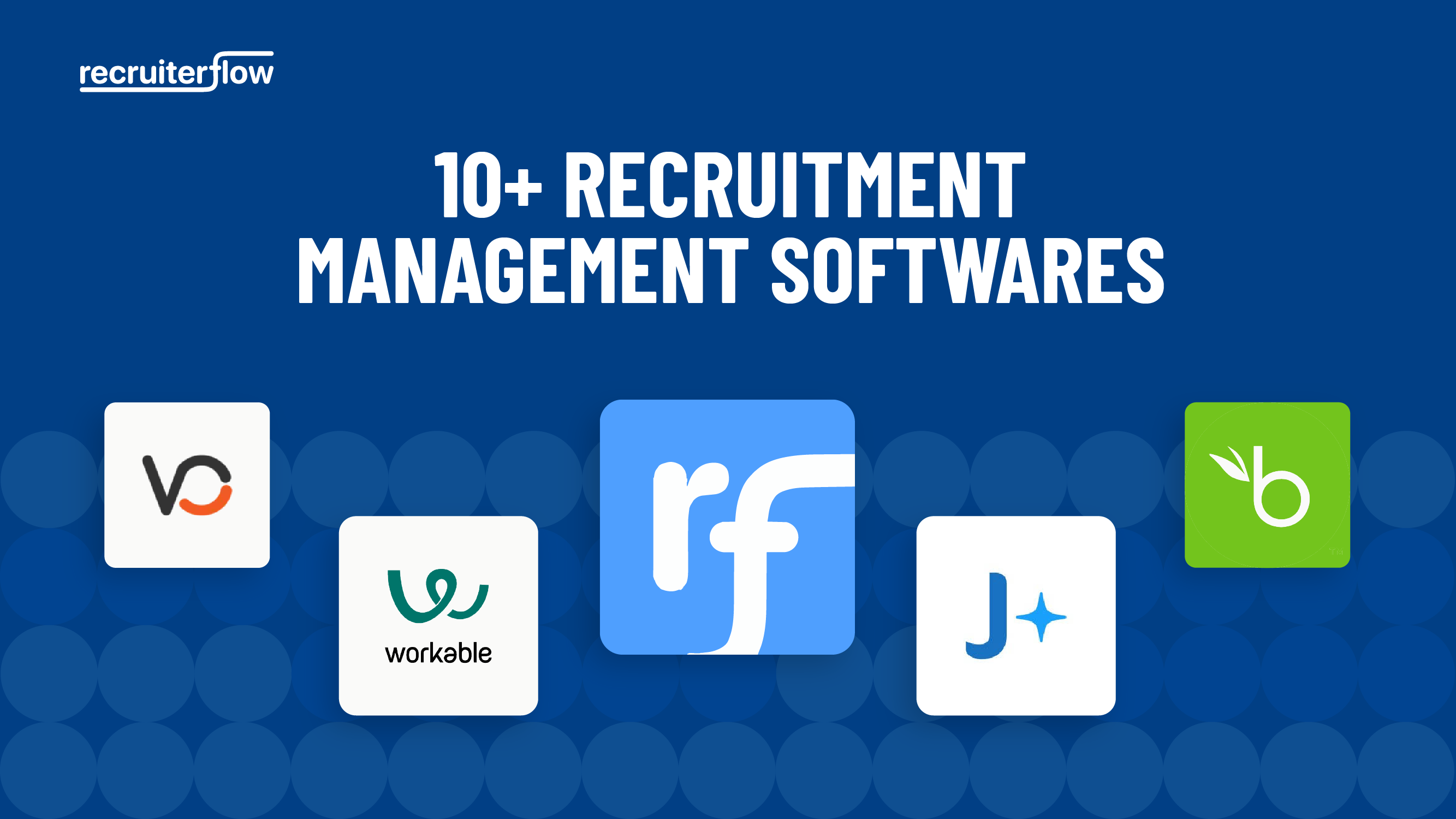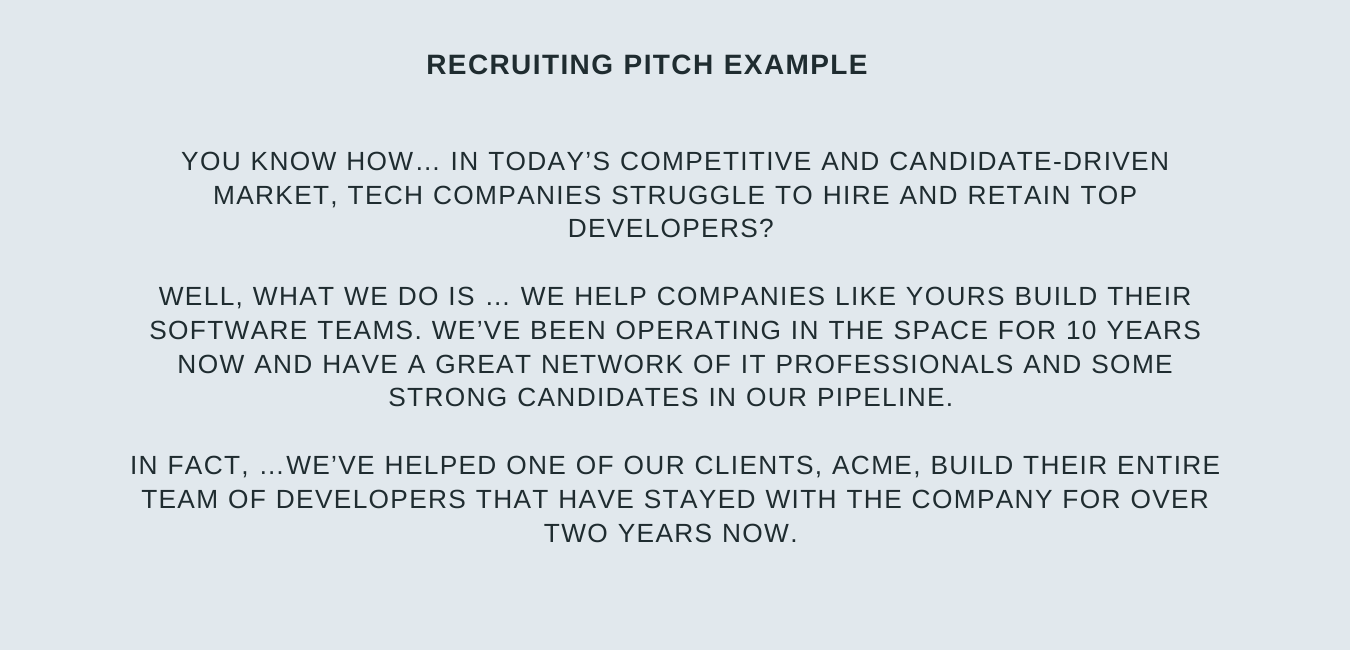
How to Create the Perfect Recruitment Sales Pitch [With Examples]

Recruiters, what is it that you really do? If your answer is that we hire top x% talent in Y market or Z geography, you’ve got another thing coming. Almost every other competitor out there is using a different version of the same recruitment sales pitch. Frankly, hiring managers are tired of hearing the same thing over and over again from different recruiters.
The real question that your prospects are asking here is hidden – “Why should I be bothered?”
To find the answer, we turn to the legendary inventor Sakichi Toyoda (also the father of Kichiiro Toyoda – Founder of Toyota) and his 5 why framework. This framework has now been adopted for sales & marketing as a 3 whys framework.
So, if you recruit the top 1% of sales talent,
WHY should I talk to you?
Because we identify and recruit the top 1% of software sales talent nationally
WHY should I bother?
As VP of sales, this will help you meet your recruiting targets.
WHY does that matter?
Meeting your recruiting targets will directly lead you to achieve your target sales quotas in both the short and long term.
Now, attaining sales quotas is something a VP of Sales would care deeply about. Likewise, every prospect that you talk to has a couple of buttons that when pushed, immediately get their attention. And that’s your pitch.
Let’s talk about what’s a pitch and a step-by-step methodology to create a compelling pitch.
What is a Recruitment Sales Pitch?
Your recruiting pitch is essentially a self-recruitment marketing tool. It is a condensed overview of the value you deliver or the pain point that you solve, typically delivered in 30-60 seconds — about the time of an elevator ride, hence the name elevator pitch. Any longer, you might monopolize the conversation and lose the other person’s interest. With such a short span of time to deliver your pitch, you need to grab your listener’s attention, communicate why you are valuable in the space, leave a lasting impression, and open up a discussion about the next step—a follow-up call, a referral, a meeting, or a partnership.
How to create the Perfect Sales Pitch for your recruitment business?
Perfecting your recruitment sales pitch can take some time. It’s likely that you will go through several versions of your pitch before you find one that is compelling and sounds natural in conversation. It would work wonders if you could add the following short text: Using a versatile content creation tool can streamline this process by allowing you to create, refine, and adapt your pitch materials efficiently.
Also Read: 6 Steps to Building a Strong Recruiting Sales Pipeline
Before you start, you may ask yourself the following questions. The answers to these questions will help build your recruiting sales pitch.
- Who is your customer and what is their pain point?
- What do you offer? Focus on Key Benefits and Unique Selling Points
- Why do your customers need it? How you are different and what impact do you make
Once you’ve written down the answers to the questions, you can get started with creating your recruiting sales pitch.

Formulas to Construct Your Recruiting Sales Pitch
Marketing expert Antony Gaddie breaks down his pitch into three short succinct sentences:
Do you know how.. ? < Focus on target market pain point >
Well, what we do is … < Focus on the benefits and feelings >
In fact …< Focus on a testimonial success story that supports the previous statement >
Let’s see what some recruitment sales pitch examples might look like for agencies focusing on different markets:

Do you know how… many B2-B firms struggle to find and hire top sales talent?
Well, what we do is…we find the top 10% of sales talent and place them at B2B firms. As former sales leaders, we understand the space really well. Last quarter, we’ve placed top salespeople at companies like Salesforce, Oracle, SAP, and many more!
In fact… 98% of our placements have even hit their quota in their very first year.
Sales trainer Jim Nudelman devised a four-step process for crafting a compelling recruiting sales pitch:
Step 1 – Begin with an Action Phrase.
Step 2 – Add a one-sentence statement about what you do. (“I do Y” — What do you help people or businesses do?)
Step 3 – Give a statement of the specific impact. (“People who use my services find Z” — list one or two things from the perspective of your potential client.)
Here are some recruitment pitch examples-
My name is X and I am a specialist sales recruiter in Chicago. We have a great network of sales talent and help great B2B software companies build world-class teams. In the last quarter, our placements have brought in more than 100 million dollars in revenue across multiple growth stage SaaS companies.
I am a full-service tech recruiter in <city name>. I help software companies build great teams and grow their businesses. We have helped our client companies significantly reduce their time to hire and employee turnover rates. In fact, we helped <company name>, build their entire team of developers that have stayed with the company for over two years now.
Following these sales formulas, put together all the sections of what you’re going to say. Once you have your information, tie it all together and edit out any clunky sentences and information that doesn’t absolutely need to be there. Make sure it flows well and time yourself delivering your pitch. It should be no longer than 30-60 seconds. Your pitch needs to be snappy and concise, so the shorter it is, the better!
Keep in mind that different audiences may require different pitches. Before you create a recruiting sales pitch, it is important to understand who your audience is. This exhaustive guide to business development for recruiting agencies will help you identify the steps you should take. You’re more likely to succeed if your elevator speech is targeted at a specific audience. Think of who you’re communicating to, consider some variations, and tweak your pitch accordingly.
Also, read our blog on recruiting skills
Other things to remember when you are delivering your recruiting sales pitch
Ask a Question to Start a Discussion
After you’ve given your short pitch with an overview of who you are and what you do, look to engage your listener. Prepare a series of open-ended questions that will keep the conversation going and prompt them to talk about their role in their business.
Make a request
End the interaction by making a specific request. Do you want that person’s business card or contact details or 15 minutes of their time? Is your goal to schedule a meeting with him/her? Do you want to ask for a referral? These goals are the reason you are creating your pitch, so it is crucial that you end with this step.
Practice
Like anything else, practice makes one perfect. The more you practice your recruiting sales pitch, the more natural it will sound in conversation and not come off like an aggressive sales pitch. You will also sound more confident, which is key to gaining the trust of future prospects.
Remember to stay aware of your tone as you deliver your pitch. Practice until the pitch feels natural and not like something that you’ve rehearsed, even though it is!
Your pitch is a great way to put your best foot forward when you have only a small window of opportunity to make a good impression.
Recruitment

